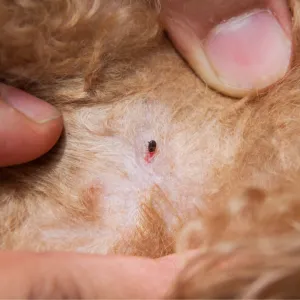Fleas are a common and persistent nuisance for dog owners, often leading to uncomfortable itching and potential health issues for our beloved pets. While commercial treatments are readily available, many pet parents are seeking natural and chemical-free alternatives to protect their dogs and the environment. This guide explores effective Home Remedies To Get Fleas Off Dogs, focusing on safe, accessible, and natural solutions.
Identifying Flea Infestations in Your Dog
The most obvious sign of fleas is excessive scratching, often accompanied by small, red bumps on your dog’s skin. You might also notice hair loss, especially around the tail base or groin area, and restlessness. Flea bites can trigger flea allergy dermatitis, a common allergic reaction in dogs. Beyond irritation, severe infestations can lead to anemia due to blood loss, or tapeworm infections if your dog ingests fleas. In some cases, fleas can transmit bacteria like Bartonella, causing symptoms such as fever, nausea, irregular heartbeat, and loss of appetite.
 A dog scratching its ear, possibly due to fleas
A dog scratching its ear, possibly due to fleas
Understanding Flea Habitats
Fleas thrive in warm, humid environments, typically preferring temperatures between 70-85°F (21-29°C) and around 70% humidity. They actively avoid direct sunlight, which is a useful characteristic when devising preventative measures. While they can exist in various climates, states with consistently hot and humid weather, such as Alabama, Florida, Georgia, Louisiana, South Carolina, and Texas, tend to have year-round flea problems. Conversely, drier and cooler regions may experience fewer flea issues.
Natural Flea Remedies to Get Fleas Off Dogs
Fortunately, several effective home remedies can help you tackle flea infestations without resorting to harsh chemicals. These natural solutions are designed to be safe for your dog and can be implemented in various ways, from baths to sprays and environmental treatments.
Apple Cider Vinegar: A Flea Deterrent
Apple cider vinegar (ACV) is a fantastic natural remedy because fleas dislike acidic environments. ACV can help rebalance your dog’s skin and fur pH, making it an inhospitable place for fleas.
- Flea Spray: Mix six cups of apple cider vinegar with four cups of water. You can add a pinch of sea salt for added efficacy. Pour this mixture into a spray bottle and liberally apply it to your dog’s coat, ensuring you avoid the eye area.
- Dietary Supplement: Add a couple of tablespoons of apple cider vinegar to your dog’s drinking water. This can help deter fleas that your dog might ingest. It’s advisable to start with a small amount to ensure your dog continues to drink adequately.
Lemon: A Citrusy Solution
Similar to apple cider vinegar, the acidity of lemons makes them an effective natural flea repellent. Lemons are readily available and add a pleasant, fresh scent to your dog’s coat.
- Lemon Bath: Prepare a mixture by combining half a cup of fresh lemon juice with two cups of water. Add this to your dog’s regular bath water and shampoo them as usual.
- Combing/Wiping: Dip a comb into lemon juice and brush your dog’s fur. If your dog has very little hair, you can use a soft cloth dipped in lemon juice to wipe down their body.
- Household Spray: For a homemade flea spray for your home, boil thin lemon slices in water and let them steep overnight. Strain the liquid and put it in a spray bottle to use on soft furnishings where fleas might hide.
 A close-up of a dog's fur, highlighting a flea
A close-up of a dog's fur, highlighting a flea
Essential Oils: Potent Natural Repellents
Certain essential oils possess strong flea-repelling properties and can even help kill fleas. However, it’s crucial to use them cautiously due to their potency.
- Dilution is Key: Always dilute essential oils with a carrier oil such as coconut oil or avocado oil, or mix them with water in a glass spray bottle. Never add essential oils directly to your dog’s drinking water.
- Effective Oils: Consider using lavender, rose geranium, lemongrass, or rosemary essential oils. Apply the diluted mixture to your dog’s back of the neck, avoiding the eyes and ears.
- Collar Treatment: You can create a DIY flea collar by dipping your dog’s collar in water containing a few drops of essential oil, allowing it to dry completely before placing it on your dog.
Important Note: Ensure your dog cannot lick the treated areas, as ingesting certain essential oils can cause digestive upset or toxicity.
Coconut Oil and Neem Oil: Dual-Purpose Oils
- Coconut Oil: Rubbing a small amount of coconut oil onto your dog’s coat can help repel fleas and leave their fur looking shiny and healthy. Unlike essential oils, coconut oil is safe for ingestion, and adding a little to your dog’s food can also provide antibacterial benefits.
- Neem Oil: Mix neem oil with water and spray it on affected areas to soothe itchiness and combat fleas. While generally safe if ingested, neem oil has a strong taste that most dogs find unpleasant.
Baths and Dips: Washing Away Fleas
For dogs who enjoy bath time, natural baths and dips can be highly effective.
- Natural Shampoos: Use organic soaps and natural pet shampoos. You can enhance their flea-repelling power by adding a few drops of your chosen essential oil to the shampoo or bathwater.
- Rosemary Dip: Steep fresh rosemary leaves in boiling water for a few minutes. Strain the liquid and dilute it with warm water until it’s a comfortable temperature for your dog. Allow your dog to soak in this rosemary-infused water. Ensure your dog doesn’t drink the dip.
When choosing over-the-counter products, consider options like chewable flea and tick protection for dogs if natural remedies alone are not sufficient, but always consult your veterinarian.
Flea Prevention in the Environment
Treating your dog is only half the battle; you also need to address fleas in your home and yard, as these can be breeding grounds.
DIY Flea Traps
An easy and effective way to catch fleas is by using a simple trap. Fill a shallow bowl with warm water and add a few drops of dish soap. Place this bowl on the floor overnight, especially in areas where your dog sleeps. The soap makes the water viscous and sticky, trapping the fleas. In the morning, dispose of the water and thoroughly wash the bowl.
Diatomaceous Earth (Food Grade)
Food-grade diatomaceous earth is a fine, powdery substance derived from fossilized algae. When sprinkled on carpets, floors, and pet bedding, it dehydrates fleas and their eggs, effectively preventing further infestations. Apply a thin layer, pay attention to your dog’s favorite spots, and leave it for 48 hours before vacuuming it up. This is a powerful natural flea and tick treatment for dogs that should not be overlooked.
Steam Cleaning and Vacuuming
Regular vacuuming is crucial, especially in areas your dog frequents. Using a vacuum with a water filtration system can help drown fleas and eggs, preventing re-infestation. Steam cleaning your carpets and upholstery also helps by flushing out dust and flea eggs, contributing to a cleaner, flea-free environment.
 An illustration showing a dog's coat with fleas
An illustration showing a dog's coat with fleas
Yard Maintenance and Flea-Repellent Plants
Your outdoor space can be a significant flea habitat. Keep your yard tidy by removing dead leaves, debris, and weeds. Planting flea-repellent herbs like lavender, spearmint, and lemongrass around your yard can also help deter these pests.
Harnessing Sunshine
Fleas are highly sensitive to sunlight. Maximize natural light exposure in your home by opening curtains and blinds. Clearing dead plants from your yard also allows more sunlight to reach the ground, making it a less favorable environment for fleas.
While natural remedies may take a little longer to show results compared to chemical treatments, they offer a safer and more sustainable approach to managing flea infestations. For dogs with severe allergies or very heavy infestations, consulting your veterinarian about appropriate flea tick meds for dogs might be necessary.
References:
- PetMD. (n.d.). Fleas on Dogs and What You Can Do About Them.
- Banfield Pet Hospital. (2012). [Data on flea-infested states] (Note: Direct link to specific 2012 Banfield data not available, cited as a general reference from the original article).
